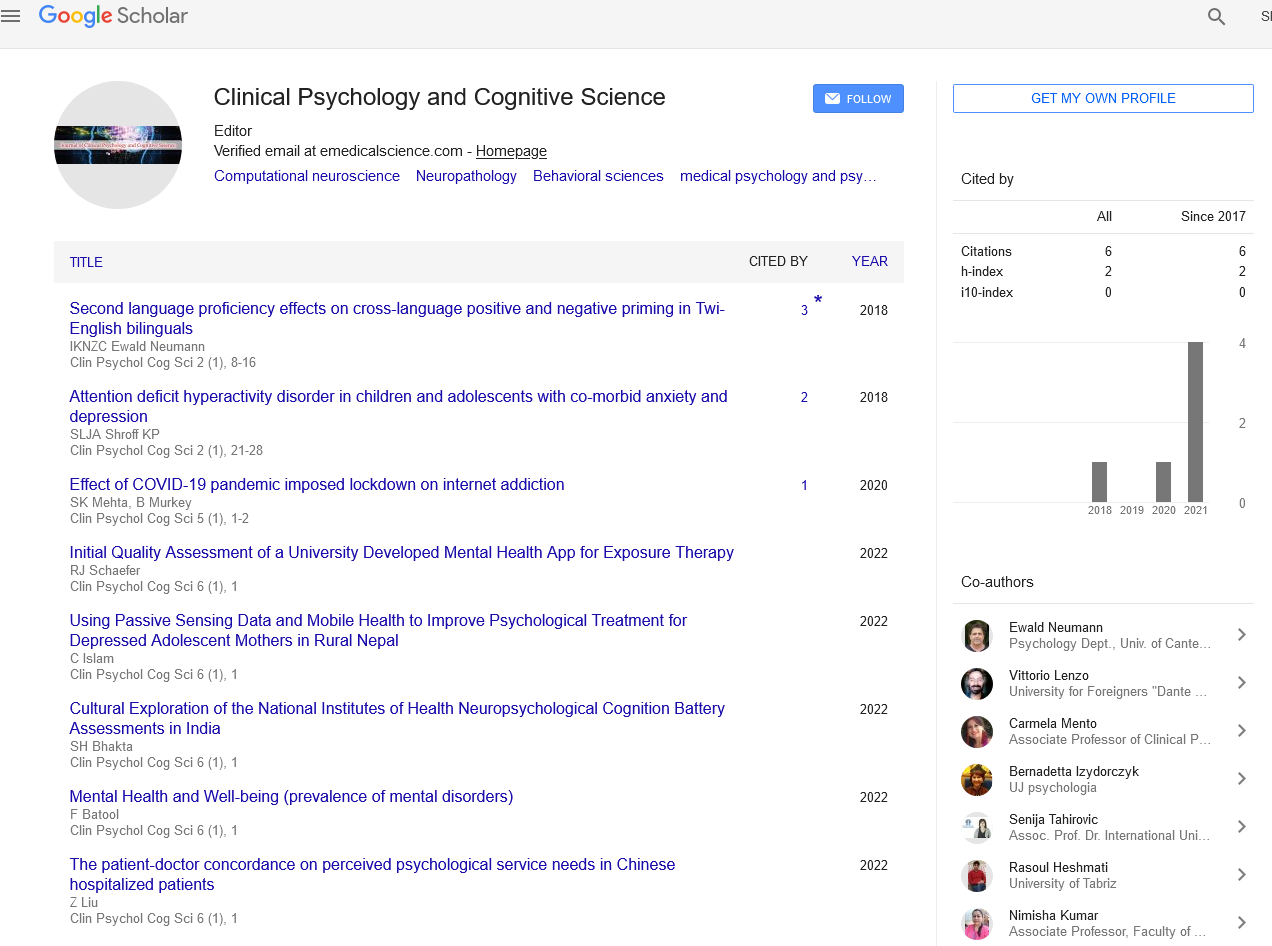Summary on causes, diagnosis and serious risk management of Anorexia nervosa
Received: 08-Nov-2021 Accepted Date: Nov 22, 2021; Published: 29-Nov-2021
Citation: Morris S. Summary on causes, diagnosis and serious risk management of Anorexia nervosa. Clin Psychol Cog Sci 2021;5(3):8.
This open-access article is distributed under the terms of the Creative Commons Attribution Non-Commercial License (CC BY-NC) (http://creativecommons.org/licenses/by-nc/4.0/), which permits reuse, distribution and reproduction of the article, provided that the original work is properly cited and the reuse is restricted to noncommercial purposes. For commercial reuse, contact reprints@pulsus.com
Abstract
Anorexia nervosa has the highest mortality rate of any psychological disorder. It has a prevalence of about 0.3% in young women. It is more than twice as common in teenage girls with an average age of onset of 15 years. 80%-90% of patients with anorexia nervosa are female. Loss of appetite is a major cause of weight loss in young women and is the cause of admission to pediatric and adolescent clinics. Most general practitioners have few cases of severe anorexia nervosa, which cause immense stress and frustration among friends, family and professionals.
Description
Anorexia nervosa has the highest mortality rate of any psychological disorder. It has a prevalence of about 0.3% in young women. It is more than twice as common in teenage girls with an average age of onset of 15 years. 80%-90% of patients with anorexia nervosa are female. Loss of appetite is a major cause of weight loss in young women and is the cause of admission to pediatric and adolescent clinics. Most general practitioners have few cases of severe anorexia nervosa, which cause immense stress and frustration among friends, family and professionals.
Causes
There is no single cause for anorexia nervosa. A genetic predisposition is necessary for the onset of the disease, but it does not seem to be sufficient. Twin and family studies, brain scans of affected and unaffected families, and modern multi-centre genetic analysis are characterized by compulsion, perfectionism, competitiveness, and perhaps autism which support the observation in families.
Anorexia nervosa is caused, for example, as a coping mechanism for developmental challenges, transitions, family conflicts, and academic pressures. Sexual abuse can cause loss of appetite, but less often than other mental illnesses. Adolescent and adolescent onsets are particularly common triggers, but loss of appetite is found in well-functioning families without obvious triggers.
Diagnosis
Diagnosis is usually suspected at school, family, friends, and young patients before consulting a doctor. Well-hidden weight loss can lead to symptoms such as depression, compulsive behavior, infertility, and amenorrhea. Alternatively, weight loss can be assumed to be secondary to allergies or other physical illnesses. Most patients can be positively diagnosed with mental weight loss without a series of complex tests to establish a diagnosis of exclusion. Basic health tests, blood tests, electrocardiograms, patient weighing and measurement can give the patient a chance to return and reveal psychological problems.
If patients refuse to weigh, it is worth investigating and asserting their fears carefully. Doctors should not collude with illness, but should be advisable not to run marathons, ski, or take harmful actions such as in vitro fertilization while they lost their weight. It is the responsibility of primary care to identify and address recurrences and initial relapses and to assist patients and relatives in using the services appropriately. General practitioners may need the help of an eating disorder specialist, and early referrals for more detailed assessment and advice patients the message that their illness is a real problem.
Serious risk management
The degree of physical risk should be assessed at the time of diagnosis. There is no safe cut-off weight or body mass index. Survival analysis shows that death is rare if underweight is maintained only by starvation. Even if the obesity index is less than 12, the patient is more likely to die if the patient's weight fluctuates more rapidly than if it is stable. Frequent inhalation and abuse of substances also increases the risk.
It is mandatory to take treatment for anorexia nervosa required by the Mental Health Law in acute emergencies where patients are unable to accept treatment. In most countries this means detention in a hospital. Legal accountability becomes less important when the imminent danger or irreversible deterioration of life is over. Many centers rely on long warrants to continue force-feeding to a healthier weight. Otherwise, there is a risk of repeated cycles of adhesion and recurrence. In practice, patients in extremis can often be treated with their consent. Voluntary treatment is more likely when the clinician is experienced at managing anorexia and can confidently assess and tolerate fairly high levels of risk in the interests of collaborative therapeutic relationships, rather than coerce patients. Even legal measures of compulsion may be used in a helpful therapeutic way, though, and should not be avoided at all costs.
Conclusion
The best place to accept a patient with life-threatening anorexia nervosa is not always clear. Acute wards, especially those specialized in endocrinology, gastroenterology, or diabetes, are usually superior to general psychiatric wards. Some non-specialized wards have nurses who are experienced in treating patients with eating disorders. These nurses will help the patients to implement the recommendations and "correct" your mistakes when faced with secret loss of appetite pressure.





